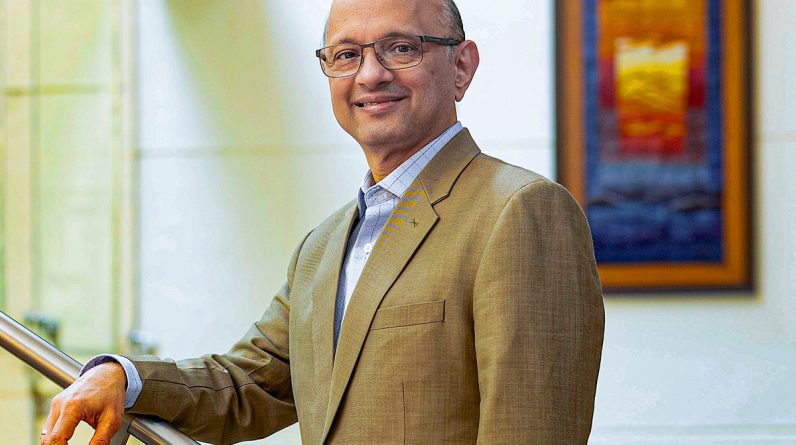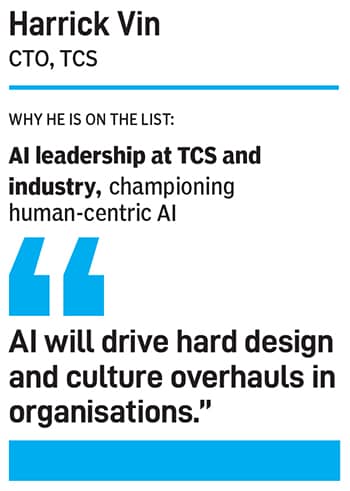
Harrick Vin, CTO, TCS
The rise of generative AI, and the promise of unprecedented transformation of enterprises well beyond IT have put experts such as Harrick Vin at the centre of the Indian IT sector’s AI efforts.
Vin took over as the CTO of Tata Consultancy Services (TCS) about two years ago. Within TCS, the former computer sciences professor is in the thick of the company’s strategy to deploy AI technologies to ‘assist, augment and transform’ IT systems for its customers. Within the industry, Vin is a proponent of human-centric AI.
“Two things stand out for me. One is the shift in focus from task-level use cases to activity-level agents and potentially end-to-end value-chain-level agent networks focussed much more on outcomes and value,” Vin tells Forbes India in an interview.
 “Second, from the first generation use cases like summarisations or automations of certain actions, there is a gradual shift towards the augment category.” This is about AI going beyond information and automation to offering expertise.
“Second, from the first generation use cases like summarisations or automations of certain actions, there is a gradual shift towards the augment category.” This is about AI going beyond information and automation to offering expertise.
Can AI help an underwriter make better recommendations about potential risk, or a complaint or claims handler in an insurer be more effective so that the end customer has a better result? Such are some early scenarios.
This isn’t about summarisations or creating drafts. This is about raising the quality of work of an individual and eventually the organisation.
In the context of software engineers, can AI recommend better architecture, or what kinds of test cases to prioritise? Or in the case of training or upskilling, can AI recommend the most relevant skill to immediately focus on? This is where the industry is headed, Vin says.
“This is important because there is a big gap between average and elite,” he says. “Therefore, can we use AI technologies to help, say, an underwriter with a couple years of experience as good as one with 15 years of experience.” And that, in turn, has big implications for every business and type of organisation in the world.
View the full list here
Vin is a TCS Fellow and a Fellow of the Indian National Academy of Engineering (INAE), as well as a Distinguished Alumnus of IIT-Bombay.
Previously, he’s held several key positions at Tata Consultancy Services, including chief services innovation officer and vice president and chief scientist at the Tata Research Development and Design Centre (TRDDC). He also founded Digitate, a TCS venture focussed on cognitive automation, and led the development of ignio, a cognitive automation product for enterprise IT.
Before TCS, Vin was a professor of computer science at the University of Texas, Austin, for 15 years, where he founded research laboratories focussed on distributed multimedia computing and advanced systems. He holds a BTech degree from IIT-Bombay and a PhD in Computer Science and Engineering from the University of California, San Diego.
Also read: Ashish Vaswani’s Essential AI wants to use powerful AI to solve humanity’s biggest challenges
Today, TCS has delivered hundreds of AI projects to its biggest customers around the world. More broadly, in addition to cognitive automation, other initiatives include AI in healthcare, where TCS is applying AI to accelerate drug discovery, precision oncology and personalised medicine; and sustainability solutions, in which AI-powered models are being developed for environmental remediation, such as bio-remediation of plastics using bacterial knowledge graphs.
Circling back to the big-picture impact of AI, “one of the biggest implications in my mind is this concept of hybrid workforce”, Vin says. “You have people and machines almost working shoulder to shoulder, with machines augmenting people, and people augmenting machines continuously, thereby creating almost like a virtuous cycle of machines improving people and people improving machines through feedback, appropriate training, retraining, fine tuning all of that.”
This will shift humans “from doers of work to almost trainers and interrogators of machines”, he says. “And this is not a one-time shift because machines will keep getting better as we build more sophisticated agents and agent networks.”
Therefore, “the role of people will shift fundamentally to focus a lot more on the why and the what rather than the how. And that’s a fundamental shift that is going to happen.”
This all means that “organisation design itself will have to be rethought, because organisations will have to be designed for change, not for functionality”, Vin says. For an organisation to thrive in this kind of era, it will have to be designed for rapid changes or face obsolescence.
“That’s a non-trivial problem to solve. It’s not a tech problem. It’s a culture, organisation and design problem. And usually those are the harder ones to solve.”
]]>
(This story appears in the 13 June, 2025 issue
of Forbes India. To visit our Archives, click here.)








